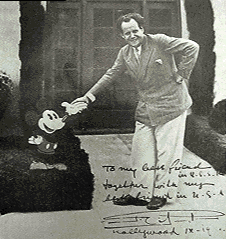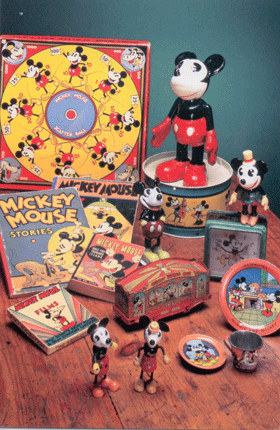
Starting with
Schickel, I would like everyone to read the quotations that start section 16,
since they do an excellent job of setting the tone of the US during the depression
and the role movies played in the lives of middle and working class Americans
during that difficult time.
In section 16, you should pay particular attention to the ways in which Walt Disney had to maneuver in order to preserve both his studio and his sanity in the first part of the decade of the 1930s. Note the different strategies, both short and long term, he employed to keep himself and his studio afloat. What particularly happened to Mickey Mouse's character during this time?
Section 17 starts with a very interesting comment about Walt Disney's personality, which you might want to jot down for later reference, particularly in doing the assigned journal this week. How did the qualities Schickel attributes to Disney help him in making his animation studio the one everyone else either envied or copied? Was there a downside of those qualities for Disney the man? How about for Disney the manager?
In section 18, we get a glimpse of Disney within the political context of a world fast moving toward World War II. How does Schickel see Walt's philosophy of life reflected in his first huge hit, The Three Little Pigs? As Disney moves more into an international market, what kind of response does he get?
The final section of this chapter reminds us of the always difficult task of making money as a producer of animated shorts. How else did Disney start to make money for his studio in the mid to late 1930s? How much money are we talking about here? What makes Disney's cartoons so marketable abroad? This is the beginning of the end for cartoon shorts at Disney: where's he going from here?
In the brief reading from Klein, you should pay particular attention to the financial information. The merchandising of cartoon characters becomes an almost inevitable process, given the disparity between production costs and potential earnings in theaters. From there, it seems to also be inevitable that the merchandising will eventually drive the cartoon production and (though Klein doesn't go there) it's a short jump from there to the lowest point of Saturday morning cartoon programming. Trace the progression through the material Klein presents.
In class, we'll
be co ntinuing
to watch the Mickey cartoons we set out to cover in last Thursday's class:
ntinuing
to watch the Mickey cartoons we set out to cover in last Thursday's class: